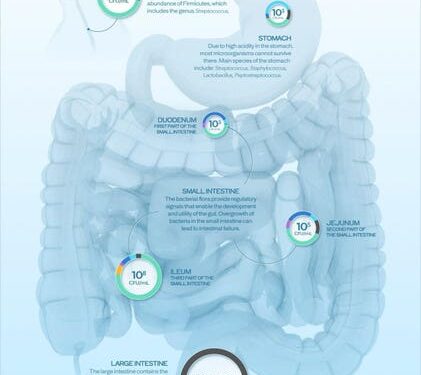The human gut microbiome contains a world of microbes. We look at the the bacteria that deeply … [+]
Getty Images
The people you spend the most time with outside your home might be playing a role in the composition of the microbes residing in your gut. In fact, your social connections are not only sharing their free time with you but also their gut microbiomes, according to a recent Nature study.
“Pairs of people who greet each other with a kiss on the cheek have the highest median (gut microbiome) strain-sharing rate. When the reciprocity of the relationship is considered (that is, both people need to nominate each other for the tie to be deemed present), we observed increased microbiome sharing in all relationship types (except for partner),” the researchers wrote. “Having relationships with people who are also connected to each other may promote microbiome circulation, leading to the formation of microbiome niches within social groups.”
The team found evidence of this microbiome sharing occurring among people even though they do not live together after taking into consideration other factors like diet, different sources of water, and medications.
“A very popular person may be more representative of the social group at large, but, as a result of their many social interactions, they may be more removed from each of their connections, in a paradox of popularity. Indeed, we observe that increases in all three social network centrality measures correlate with a decrease in average microbiome similarity to first-degree connections,” they added. “Gregarious people are less intimately related microbially to their social connections.”
The researchers closely studied close to 2000 adults in 18 isolated villages in Honduras, a country located in Central America by the Caribbean Sea. The villagers followed a traditional diet devoid of antibiotics and other medications. All of their interactions were face-to-face. The study participants agreed to have their microbiome samples collected and also answered questions related to their social relationships. Some questions included: “With whom do you spend free time?” and “Who do you trust to talk about something personal or private?”
They observed that intimate relationships share more microbes and the sharing rates increased based on the frequency of meals they shared together or free time spent together. Beyond socioeconomic factors, wealth, religion, or education, the microbiome sharing rate was the strongest predictor of social relationships, the researchers highlighted.
“Mothers have a significantly higher microbiome sharing rate with their children than fathers. Mothers may transmit bacterial strains to children during childbirth,” they added.
In a press release, co-lead author of the Nature study, Jackson Pullman, a Yale College graduate who was an undergraduate research assistant at the Human Nature Lab when the study was conducted, said:
“Think of how different social niches form at a place like Yale. You have friend groups centered on things like theater, crew, or being physics majors. Our study indicates that the people composing these groups may be connected in ways we never previously thought, even through their microbiomes.”
“What’s so fascinating is that we’re so interconnected,” added Pullman. “Those connections go beyond the social level to the microbial level.”


